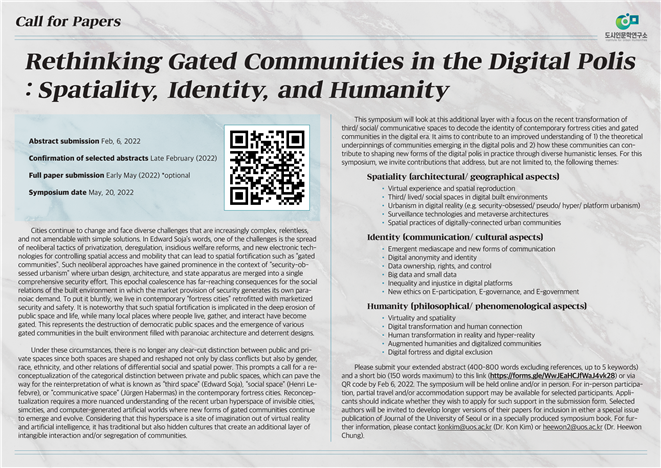- 2월 6일까지, ‘디지털 폴리스의 폐쇄적 공동체’ 관련 발표원고 모집
서울시립대학교 도시인문학연구소(소장 송석휘)는 “디지털 폴리스의 폐쇄적 공동체 다시보기: 공간성, 정체성 그리고 인간성”을 주제로 개최되는 국제학술대회의 발표원고를 2월 6일까지 모집한다.
이번 학술대회에서는 코로나 팬데믹 이후 디지털 전환이 가속화되면서 공적 공간의 소실과 치안 보장에 대한 강박적 욕구가 함께 심화되는 현대도시에서 등장하는 폐쇄적 공동체와 요새 도시의 개념을 둘러싼 다양한 쟁점들을 고루 조망한다.
특히, 에드워드 소자의 제 3의 공간, 앙리 르페브레의 사회적 공간, 위르겐 하버마스의 의사소통의 공간 등 일상적, 집단적 공간 개념 틀을 통해 디지털 폴리스에서 온오프라인을 넘나드는 도시 공동체의 현재와 미래를 고찰하고자 한다.
본 학술대회의 발표원고들은 추후 소정의 심사를 거쳐 서울시립대학교 학술지의 특별판이나 해외 출판도서로 출간할 예정이다.
원고 모집 관련 기타 상세한 내용은 김건 연구교수( konkim@uos.ac.kr )에게 문의바라며, 국제학술대회 관련 자세한 사항은 도시인문학연구소 홈페이지( https://ihuos.uos.ac.kr )에서 확인할 수 있다. (관련 문의: 도시인문학연구소, 02-6490-5338)




